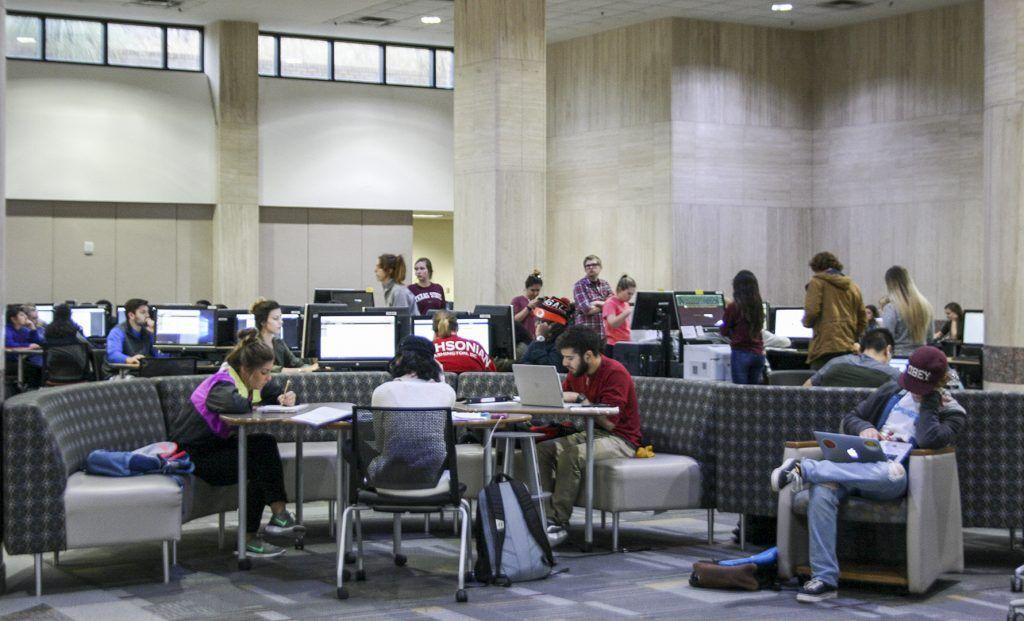The final exam season brings the topic of smartphone distraction to a forefront.
In 2021, about 89% of college students owned smartphones, the highest it has ever been. That percentage has been increasing since 2011. With an average screen time of seven or more hours a day on smartphones alone, no wonder they are seen on college campuses everywhere.
become more appealing. Students should consider silencing their phones and putting them in a different location when studying or taking a test. Not only should it improve academic performance, but it should enhance focus and even reduce anxiety.
In 2016, the University of Texas partnered with the University of Chicago and conducted a study testing student academic performance and ability to focus on a singular task. The test within this experiment was the distance their cell phone was to each student during tasks. The results proved that the closer a cell phone was to each student with varying visibilities, the more distracted they became and the poorer they did on the test.
Distractions can often be the tipping point in a student’s ability to remain in study mode. Removing distraction is effective in improving grades.
A solution some have suggested would be to ban technology from the classroom altogether. While that is an extreme option, there are other ways to have those distractions besides the phone itself. Technology within the past decade has grown exponentially, including the invention of the smartwatch and tablet that do just about everything a smartphone and the computer can. A technology ban is not entirely realistic.
Instead, a simple solution like silencing a cell phone and stowing it in a backpack is a great alternative to keeping it out of sight when studying or going to class.
Ohio University researcher Lauren R. Elliot-Dorans found that 52 to 79% of college students use computers in the classroom to take notes or do homework. Elliot-Dorans found that, when used for class-related purposes, technology can be very beneficial to the learning environment and make note-taking easier and more proficient.
In that same study, however, Dorans also discovered that multitasking on the computer or tablet can not only lessen the focus on class lecture but also distract those in the surrounding area as well. Especially when the content is not class-related, this can decrease academic performance and have an adverse effect on multiple students at a time.
Removing technology altogether has both positive and negative benefits within the classroom environment, but when it comes to personal study tactics, the issue is with the smartphone, not the computer.
Cell phones are ubiquitous and hard to ignore. Another reason to stow them away during tests or study sessions is the effect they have on anxiety levels.
In a study conducted by Andrew Lepp, a professor at Kent State University, he discovered interesting results when it comes to student anxiety and the presence of cell phones in the academic environment. The study measured three things: cell phone use in relation to academic performance, cell phone use in relation to anxiety and cell phone use in relation to “Satisfaction with Life” (SWL). In Lepp’s conclusion, he found that while cell phone usage decreases GPA, it can then have a direct influence on student anxiety and SWL.
When studying for quizzes or exams, stowing or removing the cell phone from view can increase focus on a task and also has a direct connection to anxiety levels. As both statistics and studies prove, taking away that distraction to a point where no notifications can be heard or seen can greatly increase study efficiency, and hopefully, better grades.
-Megan Stanford is an international relations junior
The University Star welcomes Letters to the Editor from its readers. All submissions are reviewed and considered by the Editor-in-Chief and Opinion Editor for publication. Not all letters are guaranteed for publication.
Opinion: Time to distance yourself from your phone
Megan Stanford, Opinions Contributor
December 9, 2022
0
Donate to The University Star
Your donation will support the student journalists of Texas State University. Your contribution will allow us to purchase equipment and cover our annual website hosting costs.
More to Discover











